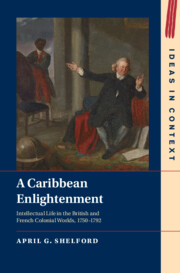Book contents
- A Caribbean Enlightenment
- Ideas in Context
- A Caribbean Enlightenment
- Copyright page
- Dedication
- Contents
- Figures
- Maps
- Tables
- Acknowledgments
- Note on the Text
- Abbreviations
- Chapter 1 What Is a Caribbean Enlightenment?
- Part I Before Breadfruit
- Part II Creating Enlightened Citizens
- Part III Tristram in the Tropics: or, Reading in Jamaica
- Introduction to Part III
- Chapter 7 Whence, Whither, and Which Books?
- Chapter 8 “Truth Hard to be Discovered”
- Chapter 9 Containing the Overflowing Fountain of His Brain
- Conclusion to Part III
- Part IV Cultivating Knowledge
- Bibliography
- Index
Chapter 9 - Containing the Overflowing Fountain of His Brain
Robert Long’s “Reflections”
from Part III - Tristram in the Tropics: or, Reading in Jamaica
Published online by Cambridge University Press: 14 September 2023
- A Caribbean Enlightenment
- Ideas in Context
- A Caribbean Enlightenment
- Copyright page
- Dedication
- Contents
- Figures
- Maps
- Tables
- Acknowledgments
- Note on the Text
- Abbreviations
- Chapter 1 What Is a Caribbean Enlightenment?
- Part I Before Breadfruit
- Part II Creating Enlightened Citizens
- Part III Tristram in the Tropics: or, Reading in Jamaica
- Introduction to Part III
- Chapter 7 Whence, Whither, and Which Books?
- Chapter 8 “Truth Hard to be Discovered”
- Chapter 9 Containing the Overflowing Fountain of His Brain
- Conclusion to Part III
- Part IV Cultivating Knowledge
- Bibliography
- Index
Summary
The approach to reading of Robert Long, brother of Edward Long, who authored The History of Jamaica (1774), was very different from Thomas Thistlewood’s, the subject of the preceding chapter. Yet Robert explored the same themes – race and slavery, religion – in his unpublished “Miscellaneous Reflections.” Like Thistlewood’s commonplace books, his reflections show that eighteenth-century readers were hardly passive vessels waiting to be filled with enlightened ideas. Their divergent readings of the widely influential Montesquieu prove that Caribbean colonists could read selectively, critically, sometimes opportunistically, even perversely. Robert’s manuscript notes also reveal an impatient and opinionated reader obsessed with the social dictates of “politeness.” Unlike Thistlewood, he primarily relied on his own experience as a planter to manage the enslaved workers on his Lucky Valley Estate, which also shaped his judgments of their intellectual and moral capacities. Like Thistlewood, he was critical of Christian orthodoxy, anxious for the fate of his soul in the face of divine justice, and restlessly sought personal transcendence.
Keywords
- Type
- Chapter
- Information
- A Caribbean EnlightenmentIntellectual Life in the British and French Colonial Worlds, 1750–1792, pp. 220 - 242Publisher: Cambridge University PressPrint publication year: 2023



